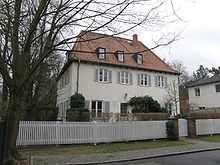|
Karl Bonhoeffer
 Karl Bonhoeffer (German: [kaʁl ˈbɔnˌhøːfɐ] ⓘ; March 31, 1868 – December 4, 1948) was a German neurologist, psychiatrist and physician. Life
Bonhoeffer was born in Neresheim in the Kingdom of Württemberg to Friedrich von Bonhoeffer (1828–1907), who worked as judge in Ulm, and Julie Tafel (1842–1936). His brother was chemist Gustav-Otto Bonhoeffer. From 1887 to 1892 Bonhoeffer studied medicine at the University of Tübingen, in Berlin and in Munich. From 1904 to 1912 Bonhoeffer worked as a professor at the University of Breslau. From 1912 to 1938 Bonhoeffer worked at the Charité in Berlin. In 1898, he married Paula von Hase (1876–1951). Two of his children were Klaus Bonhoeffer and Dietrich Bonhoeffer, both of whom were executed by the Nazis.[1] One of his daughters was Christine von Dohnanyi and one more son was chemist Karl-Friedrich Bonhoeffer. Bonhoeffer died in Berlin at the age of 80 after the end of World War II. Bonhoeffer was a part of the resistance movement against the Nazis after the Aktion T4 campaign was begun in 1939. He forged the documentation of disabled patients, suggested sources to other doctors to save patients.[2] Along with Emil Kraepelin, Bonhoeffer was a major opponent of sexual reform movement that advocated for gay rights in the Weimar Republic. His medical education served to legitimize Kraepelin's calls for "educational discipline" against gay people, including severe punishments for 'corruption.' These policies extended beyond the bounds of homosexual intercourse, instead applying to any act that involved sexual gratification. These arguments were later taken up by the Nazi party, providing the grounds to treat homosexuality as an epidemic deserving of severe punishment, in doing so providing the Nazis with the rhetoric needed to persecute gay men under the guise of conforming to scientific knowledge.[3] Works by Bonhoeffer 
References
External linksWikimedia Commons has media related to Karl Bonhoeffer.
|